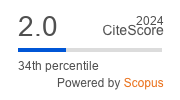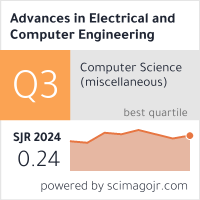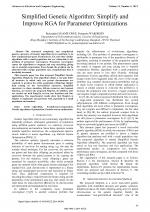| 4/2014 - 9 |
Simplified Genetic Algorithm: Simplify and Improve RGA for Parameter OptimizationsNGAMTAWEE, R. |
| Extra paper information in |
| Click to see author's profile in |
| Download PDF |
Author keywords
algorithm, evolutionary computation, genetic algorithms, optimization, particle swarm optimization
References keywords
genetic(14), swarm(11), evolutionary(11), computation(11), algorithms(9), optimization(8), convergence(5), premature(4), intelligence(4), algorithm(4)
Blue keywords are present in both the references section and the paper title.
About this article
Date of Publication: 2014-11-30
Volume 14, Issue 4, Year 2014, On page(s): 55 - 64
ISSN: 1582-7445, e-ISSN: 1844-7600
Digital Object Identifier: 10.4316/AECE.2014.04009
Web of Science Accession Number: 000348772500009
SCOPUS ID: 84921692972
Abstract
The structural complexity and complicated generic operators of Genetic Algorithm (GA) contribute to its slow computational speed. Furthermore, GA and other similar algorithms with a small population size are vulnerable to the problem of premature convergence. Premature convergence causes the algorithms to stagnate and stop searching, giving rise to wasteful computation. Even though the problem can be addressed with a larger population size, computational time is inevitably increased. This research paper has thus proposed Simplified Genetic Algorithm (SimpGA). This algorithm utilizes a one-pair-built-all structure in which only two parent chromosomes are required to produce the entire population (offspring). Rather than relying on the conventional operators, simplified operators, i.e. timer mutation, diform crossover and topmost selection, are used in the proposed SimpGA. In addition, tests are carried out with SimpGA on four test functions and four applications. The experimental results show that SimpGA is simpler to implement and performs well, especially in a small population environment. |
| References | | | Cited By «-- Click to see who has cited this paper |
| [1] R. Poli, J. Kennedy, and T. Blackwell, "Particle Swarm Optimization," Swarm Intelligence, vol. 1, no. 1, pp. 33-57, Jun. 2007. [CrossRef] [2] F. Herrera, M. Lozano, and J. L. Verdegay, "Tackling real-coded genetic algorithms: Operators and tools for behavioral analysis," Artificial Intelligence Review, vol. 12, pp. 265-319, 1998. [CrossRef] [SCOPUS Times Cited 1011] [3] L. Juan, C. Zixing, and L. Jianqin, "Premature convergence in genetic algorithm: analysis and prevention based on chaos operator," in Proc of 3rd World Congress on Intelligent Control and Automation, vol. 1, 2000, pp. 495-499. [4] G. Kootstra and B. de Boer, "Tackling the premature convergence problem in Monte-Carlo localization," Robotics and Autonomous Systems, vol. 57, pp. 1107-1118, November 2009. [CrossRef] [SCOPUS Times Cited 17] [5] R. Salomon, "The curse of high-dimensional search spaces: Observing premature convergence in unimodal functions," in Proc 2004 Congress on Evolutionary Computation (CEC 2004), 2004, pp. 918-923. [6] G. Rudolph, "Self-adaptive mutations may lead to premature convergence," IEEE Trans. on Evolutionary Computation, vol. 5, pp. 410-414, 2001. [CrossRef] [SCOPUS Times Cited 95] [7] F. Herrera and M. Lozano, "Gradual distributed real-coded genetic algorithms," IEEE Transactions on Evolutionary Computation, vol. 4, pp. 43-63, 2000. [CrossRef] [SCOPUS Times Cited 239] [8] F. Herrera and M. Lozano, "Heterogeneous distributed genetic algorithms based on the crossover operator," in 2nd IEE/IEEE Int. Conf. Genetic Algorithms Eng. Syst.: Innovations Appl., 1997, pp. 203-208. [9] C. W. Ahn and R. S. Ramakrishna, "Elitism-based compact genetic algorithms," IEEE Transactions on Evolutionary Computation, vol. 7, no. 4, pp. 367-385, 2003. [CrossRef] [SCOPUS Times Cited 261] [10] F. Cupertino, E. Mininno, D. Naso: "Real-valued compact genetic algorithms for embedded microcontroller optimization", IEEE Trans. on Evolutionary Computation Vol. 12, No 2, April 2008, pp.203-219. [CrossRef] [SCOPUS Times Cited 120] [11] Johannes Hofmann, Steffen Limmer, Dietmar Fey, Performance investigations of genetic algorithms on graphics cards, Swarm and Evolutionary Computation, Vol. 12, October 2013, pp. 33-47. [CrossRef] [SCOPUS Times Cited 26] [12] Roy Ben-Shalom, Amit Aviv, Benjamin Razon, Alon Korngreen, Optimizing ion channel models using a parallel genetic algorithm on graphical processors, Journal of Neuroscience Methods, Vol. 206, Issue 2, 15 May 2012, pp. 183-194. [CrossRef] [SCOPUS Times Cited 21] [13] Qizhi Yu, Chongcheng Chen, and Zhigeng Pan. Parallel Genetic Algorithms on Programmable Graphics Hardware, vol. 3612, pages 1051-1059. July 2005. [14] J. G. Digalakis and K. G. Margaritis, "An experimental study of benchmarking functions for genetic algorithms," International Journal of Computer Mathematics- IJCM, vol. 79, no. 4, pp. 403-416, 2002. [15] K. Premalatha and A. Natarajan, "Hybrid PSO and GA for global maximization," International Journal of Open Problems in Computer Science and Mathematics, vol. 2, no. 4, pp. 597-608, 2009. [16] C. K. Monson and K. D. Seppi, "Exposing origin-seeking bias in PSO," in Proceedings of the 2005 conference on Genetic and evolutionary computation, GECCO'05. New York, NY, USA: ACM, 2005, pp. 241-248. [17] J. J. Liang, P. N. Suganthan, and K. Deb, "Novel composition test functions for numerical global optimization," in IEEE Swarm Intelligence Symposium, 2005, 2005, pp. 68-75. [18] M. Negnevitsky, Artificial Intelligence: A Guide to Intelligent Systems, 1st ed. Boston, MA, USA: Addison-Wesley Longman Publishing Co., Inc., 2001. [19] R. Ngamtawee and P. Wardkien, "Multi-band FIR filter design using particle swarm optimization with minimax initialization," in ECTI-CON 2012, ser. 9th ECTI-CON. Phetchaburi, Thailand: ECTI Association, Apr. 2012, p. 143.14. [20] J. Kennedy and R. C. Eberhart, "Particle swarm optimization," in Proceedings of the IEEE International Conference on Neural Networks, 1995, pp. 1942-1948. [CrossRef] [21] Y. Shi and R. Eberhart, "A modified particle swarm optimizer," in Int. Conf. on Evolutionary Computation, 1998, pp. 69-73. [22] R. C. Eberhart and Y. Shi, "Comparing inertia weights and constriction factors in particle swarm optimization," in Proc of the 2000 Congress on Evolutionary Computation, vol. 1, 2000, pp. 84-88. [23] M. Clerc and J. Kennedy, "The particle swarm - explosion, stability, and convergence in a multidimensional complex space," IEEE Trans. on Evolutionary Computation, vol. 6, no. 1, pp. 58-73, 2002. [CrossRef] [SCOPUS Times Cited 8188] [24] A. Khosla, S. Kumar, and K. Ghosh, "A comparison of computational efforts between particle swarm optimization and genetic algorithm for identification of fuzzy models," in Annual Conf. of the North American Fuzzy Information Processing Society- NAFIPS '07, 2007, pp.245-250. [25] D. Calcada, A. Rosa, L. Duarte, and V. Lopes, "Comparison of GA and PSO performance in parameter estimation of microbial growth models: A case-study using experimental data," in IEEE Congress on Evolutionary Computation (CEC), 2010, 2010, pp. 1-8. [CrossRef] [SCOPUS Times Cited 15] [26] F. Yang, C. Zhang, and T. Sun, "Comparison of particle swarm optimization and genetic algorithm for HMM training," in 19th Int. Conf. on pattern recognition- ICPR, Jun. 2008, pp. 1-4. Web of Science® Citations for all references: 0 SCOPUS® Citations for all references: 9,993 TCR Web of Science® Average Citations per reference: 0 SCOPUS® Average Citations per reference: 370 ACR TCR = Total Citations for References / ACR = Average Citations per Reference We introduced in 2010 - for the first time in scientific publishing, the term "References Weight", as a quantitative indication of the quality ... Read more Citations for references updated on 2025-07-01 17:06 in 81 seconds. Note1: Web of Science® is a registered trademark of Clarivate Analytics. Note2: SCOPUS® is a registered trademark of Elsevier B.V. Disclaimer: All queries to the respective databases were made by using the DOI record of every reference (where available). Due to technical problems beyond our control, the information is not always accurate. Please use the CrossRef link to visit the respective publisher site. |
Faculty of Electrical Engineering and Computer Science
Stefan cel Mare University of Suceava, Romania
All rights reserved: Advances in Electrical and Computer Engineering is a registered trademark of the Stefan cel Mare University of Suceava. No part of this publication may be reproduced, stored in a retrieval system, photocopied, recorded or archived, without the written permission from the Editor. When authors submit their papers for publication, they agree that the copyright for their article be transferred to the Faculty of Electrical Engineering and Computer Science, Stefan cel Mare University of Suceava, Romania, if and only if the articles are accepted for publication. The copyright covers the exclusive rights to reproduce and distribute the article, including reprints and translations.
Permission for other use: The copyright owner's consent does not extend to copying for general distribution, for promotion, for creating new works, or for resale. Specific written permission must be obtained from the Editor for such copying. Direct linking to files hosted on this website is strictly prohibited.
Disclaimer: Whilst every effort is made by the publishers and editorial board to see that no inaccurate or misleading data, opinions or statements appear in this journal, they wish to make it clear that all information and opinions formulated in the articles, as well as linguistic accuracy, are the sole responsibility of the author.



